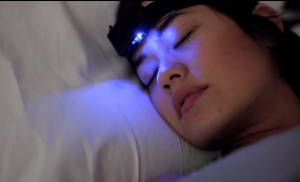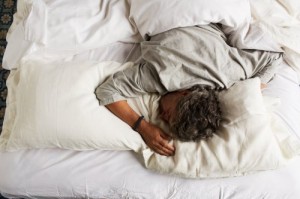When you don’t get enough sleep, it sucks. Furthermore, poor sleeping habits can do a lot of bad things to your body. Some studies have even shown that the less sleep you get, the shorter your lifespan will be.
According to the National Institutes of Health, when you get the recommended amount of sleep — 7.5 to 9 hours of sleep per night — you get the following perks:
- A decreased chance of motor vehicle accidents
- Less chances of becoming obese, because sleep deprivation increases appetite
- A reduced risk of diabetes and heart problems
- Improved concentration, reaction time and memory
- Better moods and creativity patterns
- A stronger immune system that can better ward off colds and infections
![]() In short, the longer you sleep the better it is for your health. That said, the quality of your sleep also matters. It’s possible to sleep ten hours or longer and yet still have a poor resting cycle.
In short, the longer you sleep the better it is for your health. That said, the quality of your sleep also matters. It’s possible to sleep ten hours or longer and yet still have a poor resting cycle.
According to the National Institutes of Health the average adult gets less than seven hours of sleep every night, which is terrible considering our bodies need at least eight or more. It is estimated that 50 to 70 million Americans have chronic sleep disorders. Worse yet, it can come from anywhere including a poor diet, lack of exercise, too much sugar or caffeine, and even living habits. Sometimes, it’s not easy to determine what’s wreaking havoc on your resting time.
That’s exactly where sleep trackers come in handy. There are plenty of devices designed to specifically track sleeping habits. Most modern wearables, smartwatches and fitness trackers now include support for this right out of the box. Others offer the support through downloadable mobile apps.
Whatever the device, we’re going to explore what they actually do and why you might need one. It’s one thing to see a feature touted for every popular gadget hitting the market, it’s another thing to understand said feature and know why it’s important.
What are Sleep Trackers and Why Would You Need One?
 The term “sleep tracker” refers to any device worn while you’re in bed, that monitors the length, consistency and quality of your sleep. Said devices come in all shapes and sizes, from niche wearable to smartwatches and fitness trackers. In fact, it’s become a pretty common feature in the modern wearable market so much that even a few smartphones now include support for sleep tracking — though we’re not entirely sure why you’d want to sleep next to your smartphone.
The term “sleep tracker” refers to any device worn while you’re in bed, that monitors the length, consistency and quality of your sleep. Said devices come in all shapes and sizes, from niche wearable to smartwatches and fitness trackers. In fact, it’s become a pretty common feature in the modern wearable market so much that even a few smartphones now include support for sleep tracking — though we’re not entirely sure why you’d want to sleep next to your smartphone.
These devices use special hardware to monitor your movements and shifts during the night. Thanks to hardware like an accelerometer, heart-rate monitor, pedometer or calorie tracker these devices can identify when you’re simply rolling over and when you’re tossing and turning. The information collected is then analyzed through mobile software, allowing you to see how well you slept during the night and for how long. If you’re not getting enough sleep, you’ll know. Furthermore, these devices aim to help you pinpoint why your sleep patterns are good — or bad.
Now, it may seem a bit silly to have an electronic device that tells you when you’re not getting enough sleep especially since you’ve been going to bed for years without something like this. Unfortunately, you may not have been getting the sleep you need no matter how early you go to bed. That’s exactly what sleep trackers are for. They help you identify any problems and fix them if necessary.
Make no mistake about it, poor sleeping habits and fewer hours of sleep means more health issues. No one wants to be unhealthy.
How Does a Sleep Tracker Detect Sleep Percentage and Quality?
To be honest, each device is different so the methods may be nothing like what we’ve described here. Most — if not all — sleep trackers detect and monitor sleep by measuring your movements during the night, however.
First, the device must detect when you’ve actually fallen asleep. Most of them do not factor in the time it takes for you to fall asleep. So, whether it takes you 20 minutes to fall asleep or 40 minutes that time is not included in your sleep cycle. Once you’ve stopped moving for a certain length of time and your heart-rate has decreased, the device assumes you are fast asleep.
Once you’ve actually fallen asleep, the device begins to measure a variety of things like heart-rate, movement patterns and velocity of your movements. Altogether, these measurements allow the device to discern how long you’ve been sleeping, and how deep your sleep is. Obviously, light sleep is less beneficial for your body and so the device will let you know when you’re resting time was poorly spent.
Some devices — such as various Fitbit models — will track sleep automatically. That is, they will constantly monitor your body’s habits and determine when you’re sleeping or napping. Other devices require you to actually activate or start a sleep monitoring mode. It really just depends on the device in question.
What Does Monitoring Your Sleep Do, Exactly?
 For the most part, we go to the doctor whenever we believe there’s something wrong with our health. The doctor will then tell you how to react to this issue, whether that be taking medicine or altering daily routines. The main point is that knowing about any problems can help you stay in good health or return to it. The same holds true for sleeping habits.
For the most part, we go to the doctor whenever we believe there’s something wrong with our health. The doctor will then tell you how to react to this issue, whether that be taking medicine or altering daily routines. The main point is that knowing about any problems can help you stay in good health or return to it. The same holds true for sleeping habits.
Just the act of monitoring your sleep and discovering any issues will allow you to improve your health. You’ll know whether you’re getting enough daily exercise, maintaining a poor diet or even staying up way too late. By choosing to be conscious about these things naturally you’ll become more healthy over time. Unless of course you flat out don’t care, but that’s another story entirely.
How Should You Use the Data from a Sleep Tracker?
 You can use the data collected by a sleep tracker to determine whether or not your fitness, health and life habits are affecting your sleep. For example, if you cut back on your usual exercise routine and decide to work out less every day you can see how this affects your energy levels. Furthermore, you can improve your sleeping habits based on the information collected. Since there are so many different things that can influence your sleeping patterns, a device like this can help you pinpoint what’s wrong and what needs to change. It may take you a while to understand exactly what’s affecting your sleep and causing you to get less rest at night but the fact of the matter is, with a sleep tracker you can identify that.
You can use the data collected by a sleep tracker to determine whether or not your fitness, health and life habits are affecting your sleep. For example, if you cut back on your usual exercise routine and decide to work out less every day you can see how this affects your energy levels. Furthermore, you can improve your sleeping habits based on the information collected. Since there are so many different things that can influence your sleeping patterns, a device like this can help you pinpoint what’s wrong and what needs to change. It may take you a while to understand exactly what’s affecting your sleep and causing you to get less rest at night but the fact of the matter is, with a sleep tracker you can identify that.
It’s also beneficial to use the data collected by a sleep tracker in combination with other fitness data you may have collected about your body. Like the exercise scenario we discussed in the paragraph above, you can use all of this collected information to get a better image of your general health.
You’d be surprised that a lot of people have no idea poor sleeping habits can affect a great deal of things about the body from mood, to sex drive and even creativity. Those who get less sleep are more likely to suffer from obesity, high cholesterol, heart failure, strokes and worse.
We all need sleep, and the best way to find out whether or not you’re getting the rest you need is to get your hands on a sleep tracker.
